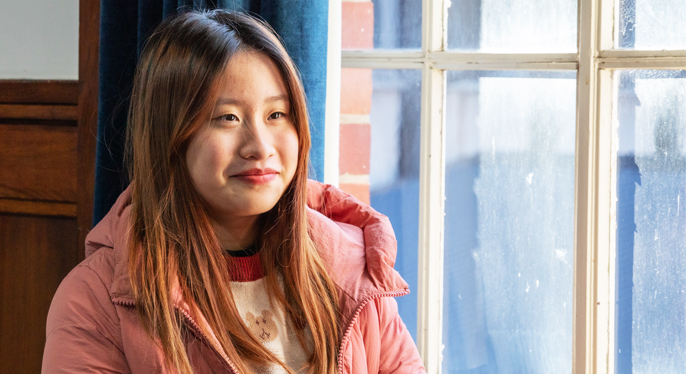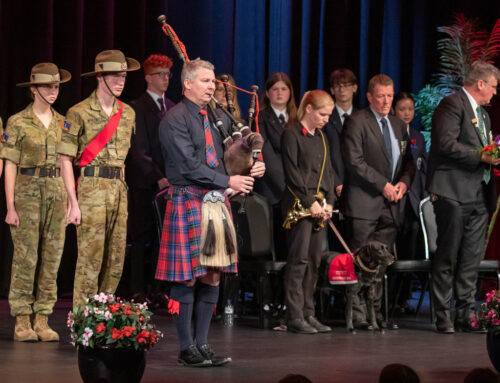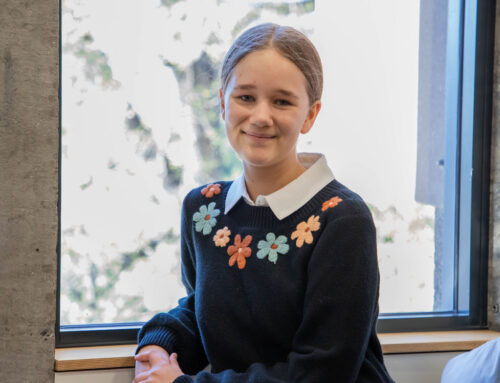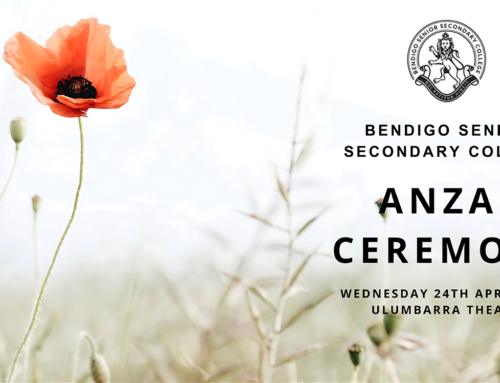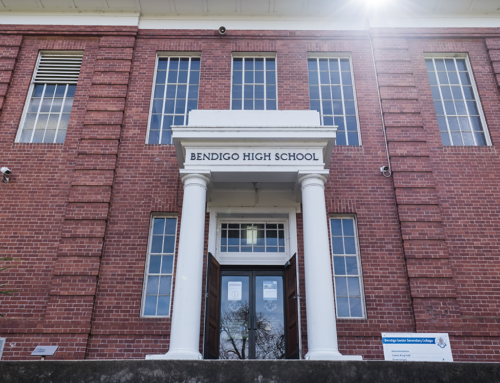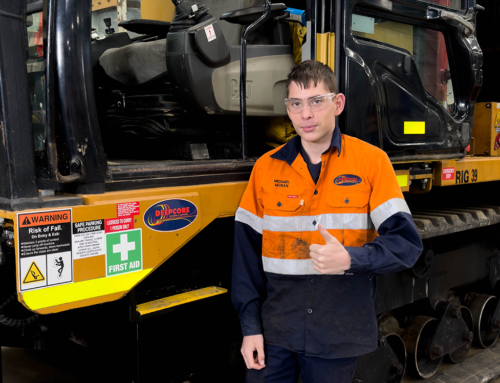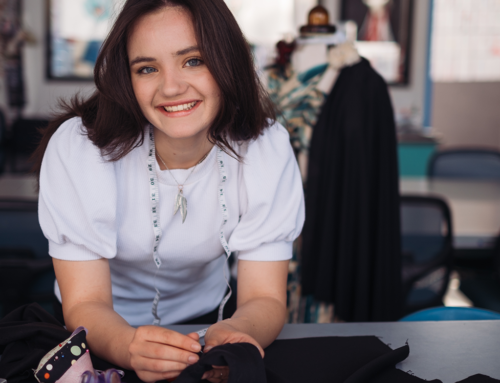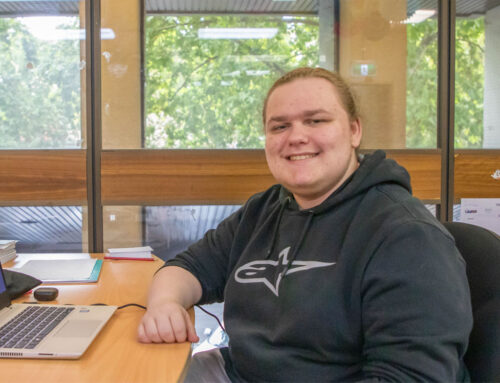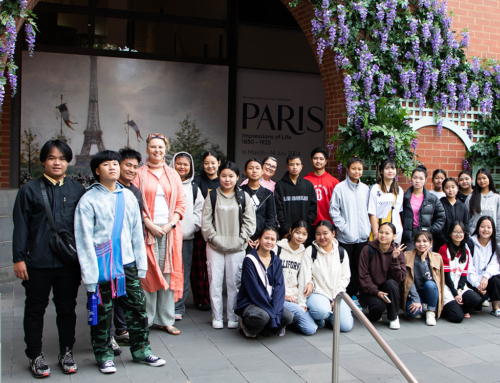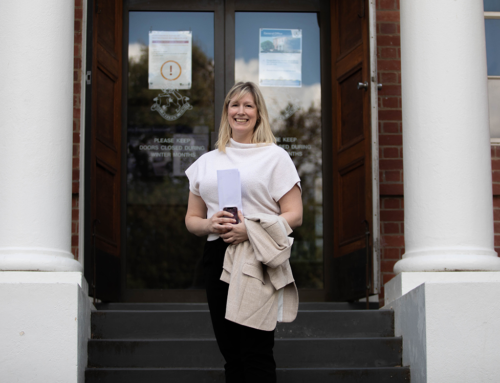Year 11 student, Lei Lin, knows from experience how important it is to have a balanced approach to learning.
Lei, who grew up in Fujian, China, came to Australia a year ago after she and her parents made the huge decision that she would continue her studies in Australia.
Lei was finding her school workload so exhausting she had little time or energy for much else, or to get the exercise her body needed.
“I did get the grades I wanted when I was in China, but now I’m in Australia, though I still work hard, I have time for exercise.
Interestingly, it was a love of sketching—mostly with pencils—that set Lei on the path to Australia. She attended after-school art classes but had only ever thought of her drawing as a hobby.
It was her art tutor who told Lei’s parents that in Australia Lei could study art as a school subject.
Lei and her family soon dived into the process of organising for her to become an international student at BSSC. However, the decision last year by the government to cap international student numbers meant that Lei’s arrival in Bendigo was delayed.
She turned the delay into a bonus. Acutely aware that her English language skills needed work, she enrolled in the Melbourne Language Centre and spent six months studying English.
The English that Lei had learnt in China had notable differences to the way Australians usually speak. She was taught the greeting, ‘Hello, how are you?’ yet in Australia Lei was confronted with, ‘Gidday, how’re you going?’.
“I was so scared of trying to speak to people at the start,” she admits, “but because of my Asian appearance many people realised they needed to speak more slowly.”
A bonus for Lei during her language studies in Melbourne was her second homestay host who was a secondary teacher and a tremendous help to her.
Before moving to Bendigo, Lei went home to China for four weeks and during that time spoke almost no English.
“I actually had to readjust when I returned,” she says, “but I did arrive in Bendigo feeling much more confident than when I’d first arrived in Melbourne.”
These days Lei is tending to eat local food rather than seeking out familiar Chinese flavours. Outside a lot more, she regularly walks around Rosalind Park or Lake Weeroona and has the time and the energy to practice yoga.
“The countryside here is lovely to visit because there are cafés and other attractions,” she says. “Rural China does not cater to tourists so well.”
This complete change in routine has contributed to a curious and very welcome change. Lei has lost a great deal of weight since coming to Australia.
“I was overweight,” she says bluntly. “I think it’s because I’m eating less noodles and rice.
Lei is also diligently improving her English skills.
However, the catalyst for her decision to move to Australia—art—is now seeing her explore completely new ways of expressing herself creatively.
Lei has chosen Visual Communication & Design as one of her subjects this year and is loving the artistic opportunities that have opened up for her.
And she’s still sketching.
“I often draw in the evening just before I go to bed and it really relaxes me and helps me sleep better.”
However, Lei feels the distance from her parents acutely and misses her friends and the pets she has in China. Due to the COVID-19 restrictions, Lei’s mum and dad are unable to visit her.
“Our three dogs were once vulnerable street dogs,” Lei says. “My mum was quite scared of dogs, but when my parents found them in a pitiful condition, they felt so sorry for them they decided to give them a home.”
Lei’s awareness of difficulties on the local level also extends to global issues. She nominates global warming as a phenomenon she is concerned about.
“The polar ice caps are melting,” she says, “and I heard this is likely to create conditions in which pandemics like coronavirus are more likely to arise.”
Meanwhile, Lei has settled in well in Bendigo and is living with homestay host, Rosalie Lake. She says people have been kind to her at BSSC.
“The teachers have all been very good to me and I feel I have the support I need,” she says.
She also loves not having to wear a uniform to school.
“I hated the dark green uniform I had in China,” Lei says. “One of my teachers told me that it was a really positive and young colour, but I didn’t like it and I was never quite warm enough in winter or cool enough in summer.
As well as Vis Comm, Lei is studying Maths Methods, Specialist Maths, Psychology, English (as an additional language) and Chinese (as first language).
Psychology presents particular challenges for Lei because it requires a whole new vocabulary. She describes the first exam as “horrible” but is now making better progress.
“My main focus is developing my vocabulary,” she says, “and I can do that because the homework load is not as heavy as it was in China.”
My favourite subjects are Maths and Art—but I love Maths the most and hope to become a Maths teacher,” Lei explains. “Maybe I will one day teach Maths, Art and Chinese!
“More than anything I want to be a teacher who makes learning really enjoyable.”
Lei hopes the pathway to this goal is via an education degree at either Melbourne or Monash University.
Asked for a ‘hot study tip’ Lei insists, you have to study what you love.
“Choose subjects that inspire you—not to just get the homework done, but areas of study that give you the energy to explore everything you can about the topics.”
Having said this, Lei is not oblivious to the fact that we all have to study subjects we do not particularly enjoy.
“If I could go back to when I was just 12 years old and give myself some advice, I would say, ‘Learn English carefully—even if you cannot find the fun in this subject, because one day you’re going to need it’.”
Despite her struggles with learning English, someone Lei deeply admires is the English tutor she had in China—a man who knew how to made their sessions fun.
“I want to be like him—a teacher who makes learning fun—I want to teach in a way that builds students’ energy to learn.”

